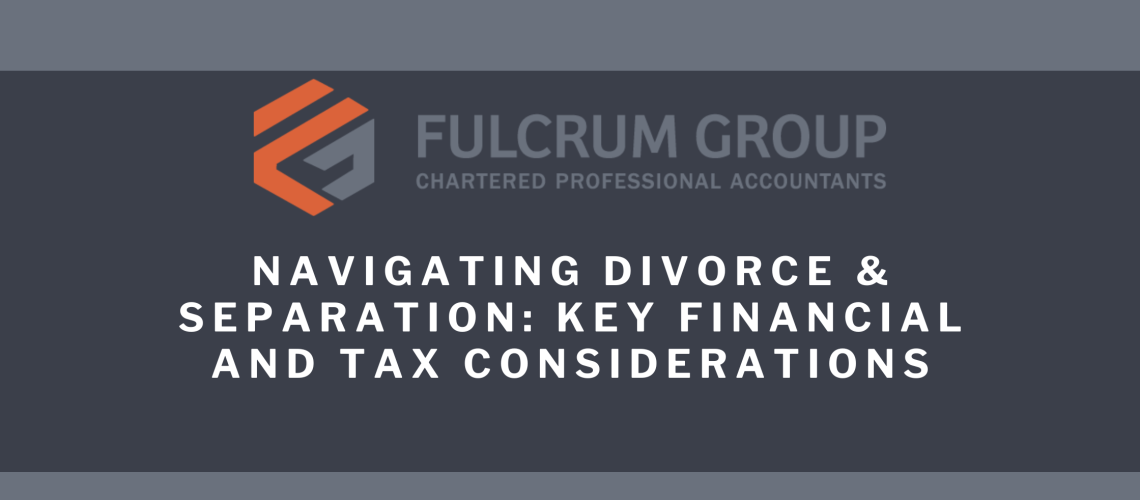Divorce and separation are emotionally and financially challenging, and they come with significant tax implications that can impact both parties. Proper tax planning can help ensure a smoother transition while avoiding unexpected tax liabilities. It’s highly recommended that you consult both a tax professional and a family law expert to fully understand how these changes affect your financial situation.
Below are some important tax considerations to keep in mind when navigating divorce or separation.
Division of Property
When dividing property during a separation, some asset transfers have no immediate tax impact, while others may trigger tax consequences:
- Personal Assets & Household Items: Transfers between spouses of personal-use items (e.g., furniture, vehicles) generally do not result in capital gains tax.
- Taxable Assets (Investments, Real Estate, Business Interests): If assets such as rental properties, stocks, or business ownership are transferred, they may trigger capital gains taxes when sold in the future.
- Family Home & Principal Residence Exemption:
- If the family home was the principal residence in preceding years, it will likely qualify for the principal residence exemption when sold. However, the sale must be reported on Form T2091, designating it as the principal residence.
- If one spouse retains ownership of the home, the transfer may qualify as a tax-free spousal rollover, depending on the divorce agreement.
- Registered Accounts (RRSPs, RRIFs, etc.): Transfers of registered accounts can be made tax-deferred when done through the issuing financial institution under a written separation agreement. Taxes are only payable when funds are later withdrawn.
- Tax-Free Savings Account (TFSA): TFSA funds can be transferred directly without triggering tax or affecting contribution room, provided there is a formal separation agreement.
- Capital Property & Rollover Considerations: Some assets may qualify for a tax-deferred rollover within 90 days of separation. Consult your accountant to ensure important deadlines are met.
Tax Filing Status & Reporting Changes
- Marital Status Change: If you are separated as of December 31 of the tax year, you must file your taxes as “separated” instead of “married.”
- CRA Notification: You must notify the CRA of your separation by completing Form RC65 (Change in Marital Status). This should be done within 90 days of separation to ensure you receive correct government benefits.
- Support Agreements & CRA Registration: If your divorce or separation agreement includes spousal or child support, you can register it with the CRA using Form T1158 (Registration of Family Support Payments). This helps reduce potential CRA inquiries at tax time.
Spousal & Child Support Payments
Spousal Support
- Taxable for the recipient: If you receive spousal support, it must be reported as taxable income on your tax return.
- Deductible for the payer: If you pay spousal support, it is tax-deductible, reducing your taxable income.
- Written Agreement Requirement: Payments must be made under a formalized written agreement or court order to be deductible.
Child Support
- Not taxable for the recipient: Child support is not considered taxable income for the parent receiving the support.
- Not deductible for the payer: Unlike spousal support, child support is not tax-deductible for the paying parent.
- Eligible Dependent Deduction:
- The parent not paying child support may claim the eligible dependent deduction.
- If both parents pay support, they can agree on who claims the deduction. If no agreement is reached, neither parent can claim it.
- If there are multiple children, the agreement can be structured so each parent claims a dependent. Consult your accountant before finalizing your agreement to ensure it meets CRA requirements.
- Medical & Childcare Deductions: Eligibility for deductions may vary based on custody arrangements.
Child Benefits & Credits
Following a separation or divorce, child-related tax benefits may be adjusted:
- Canada Child Benefit (CCB): The parent with primary custody is generally eligible to receive the CCB payments.
- Split Custody Arrangements: If custody is split, benefits are prorated based on each parent’s custody percentage.
- Carbon Tax Credits: This may also be affected by shared custody and could be split accordingly.
- Updating the CRA: To ensure you receive the correct benefit amounts, update the CRA with your custody arrangements.
Legal & Accounting Costs
- Legal Fees related to the divorce process are generally not tax-deductible.
- However, in some cases, legal fees related to obtaining spousal or child support may be deductible—consult a tax professional for guidance.
Final Thoughts
Divorce and separation are already complex, and tax implications can add another layer of challenges. Proper planning and professional advice can help you avoid costly tax surprises and maximize available benefits.
If you are going through a separation or divorce, reach out to our team today for guidance on how to best navigate the tax aspects of your situation.
📞 Fulcrum Group Chartered Professional Accountants – Your trusted partner in tax and financial planning.



